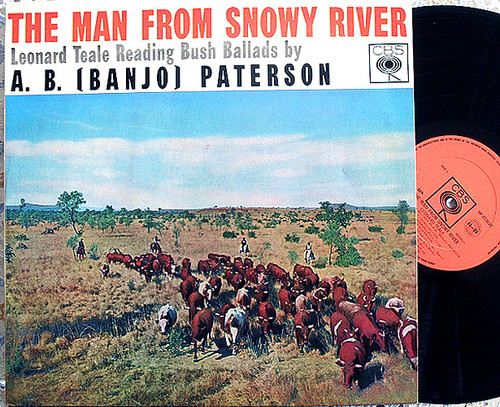This record is a broadcast transcription recording, never intending to be released to the retail market but exclusively for use by radio stations to provide program material.
This transcription record has these characteristics:
Vinyl material 150g
12 inch diameter
Mono-aural recording
33.3rpm play speed
Hand "typed" ID labelling
*** Very narrow grooves *** THIS IS EXTREMELY IMPORTANT, READ BELOW WHAT THIS MEANS
THIS IS RECORD NOT
Shellac or Acetate
Strange rotational speeds
British Information Service
Custom Service
Pressed by EMI Australia
Spectator 127 & 128
Cat# PRX.5828 & 2XS.4143-1
Late 1960's release - based on some of the material content e.g Lillian Board having just won gold medals at the Athens European Championships (1968)
PROGRAM SOURCE:
British, British, British! and very British at that, in fact when the recording first begins I thought I was listening to some old Monty Python record! The narration is very similar in style, a British posh "BBC" style of speaking - stiff upper lip!
I believe the reference to Spectator is the British weekly publication that dealt with politics, current affairs and culture, the Spectator would have provided the source material.
PROGRAM MATERIAL:
The intention of these transcription records is for public radio broadcasting. The station(s) would receive these and play the entire record or sections of the record - no music, program material was usually current affairs, science, sports or the arts related. Australia would receive news etc from the "motherland" via this type of record, I strongly suspect this would have been destined for use by the Australian Broadcasting Corporation.
Each side is one long track - there is no track spacing which must have made playing just a portion of the program material very difficult. There is hardly any pause at all between subjects being discussed, one minute the discussion is about an aircraft book and before you realise it, the discussion has moved onto blind people and how The Commonwealth is helping.
The following rough transcription is not printed anywhere, I have created this by actually listening to the entire record on one of my "special turntables" - this is not a "blow by blow" transcription as my intention is to only give an idea of the material content ... typed while listening to the recording
SIDE 1: (127)
Total duration approximately 15 minutes, each "segment" has a run time of roughly 3 minutes
Intro (music)
James Alderwell's Aircraft book content discussion - crystal gazing into the future "airliners will be flying at 4000mph in 30 years!" rocket liners are "coming" perhaps sending a President into space in the 1970's
Blind people and the Commonwealth Contribution, society running the largest sight saving organisation in the world
Glass blowing schools in England, glass workshops. Individual glass blowing schools - "I like to be in close contact with the glass, not in a factory" Female speaker seems pretty bewildered by the interview! Ms Solven, giving opportunities to "do it yourself"
Walter Winterbottom speaks about ...residential centres promoting physical recreational activities ... sports coaches, mountain activites, golf (we need many many more golf courses in the country, in fact double the number we have now)
Britain is winning more and more medals in elite sport (talks particularly about Lillian Board/track & field athelete) ...talks about coaching in sport at the elite level. Talking about sports columnists and how to "take" criticism.
Outro (music)
SIDE 2:(128)
Total duration approximately 15 minutes, each "segment" has a run time of roughly 3 minutes
Intro (music)
Architectural Association and its merger. Discussion about the students and the department of Tropical Architecture and the purpose of the Association - discussing such things as new technology e.g computers!
Rhuemetsim and the Arthritis Council - what causes Arthritis? Dr Mason provides a discussion about the possible causes, which are as yet unknown but they suspect it could be bacteria based. Aggressive treatments commonly used were aspirin, being one of the most common drugs also "gold dust" is injected. The problem is that we just don't know enough!
Kenneth Arlake speaks about collecting stamps and selling stamps. Discussion about his new book "Stamps for Investment" - collecting country specific stamps. How to select a country that could be a good stamp investment.
Britain's National Research organisation and discussion about a new technology called Tracked Hovercraft which is being studied in Cambridge. Intended as a public transport mechanism moving at 200 ~ 250mph - propulsion using a linear electric motor in conjunction with an air cushion using fans. Commercial production should begin in the late 1970's
Sir Robert Meers orchestral concerts which began in 1923. Today he has created a nationwide movement aimed initially at children and then expanded and developed into a youth organisation at a cost of only 5 shillings per year.
Outro (music)
Cover is a plain generic white cardboard, new.
New inner plastic sleeve
Vinyl is in very good condition.
SPECIAL VINYL NOTES:
This is vinyl but not as you may know it!
Older records tend to have wider grooves than contemporary pressings BUT this record is the opposite ...
The grooves are much narrower than modern vinyl records. At first glance, the vinyl record looks "unrecorded or blank" because the grooves are so narrow. I used a special 2 mil stylus tip to very roughly transcribe the above information. You could use a modern (wider) stylus but your stylus will only be sitting in the top of the groove and the resulting audio will sound "thin" and probably have some noise as well. A modern stylus cannot fit inside that tiny little groove properly.
I do not think that any substantial damage will result to the groove from playing a couple of times with a modern, wider stylus but I wouldn't recommend doing so - it is likely the wider stylus will create "wear" across the top of each groove and the audio extracted from the groove will be substantially "lacking" and noisy anyway.










